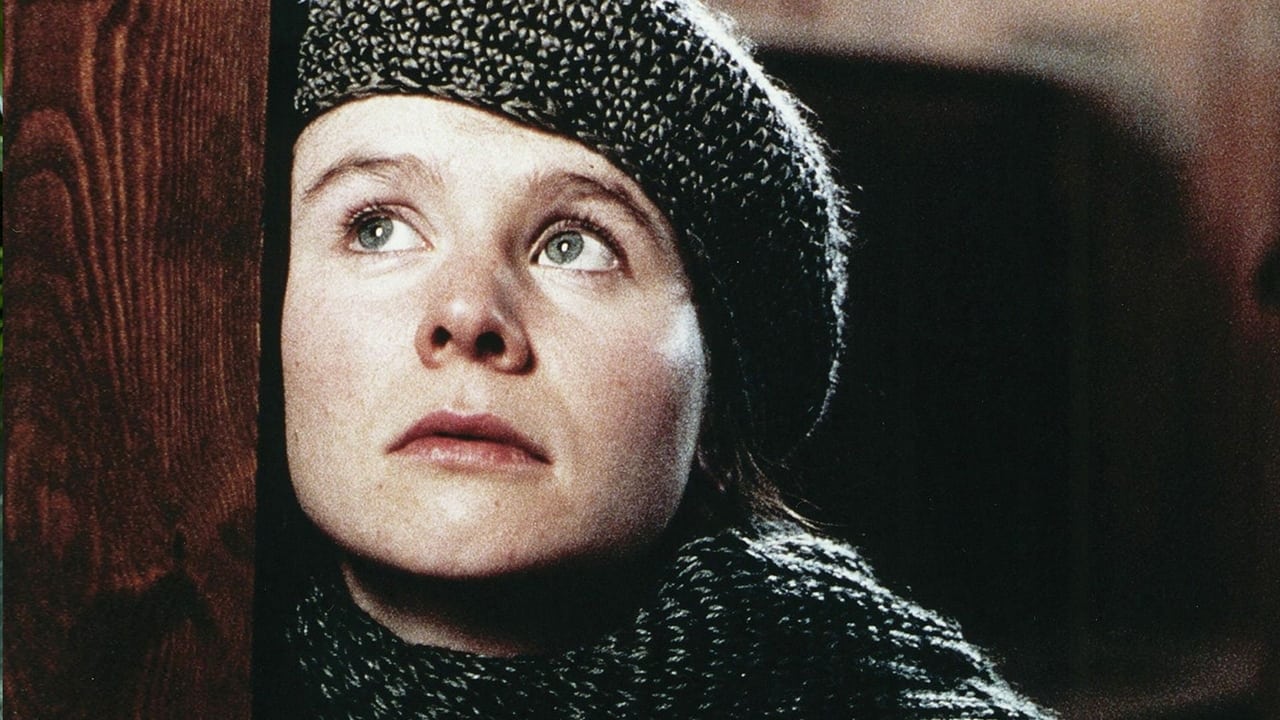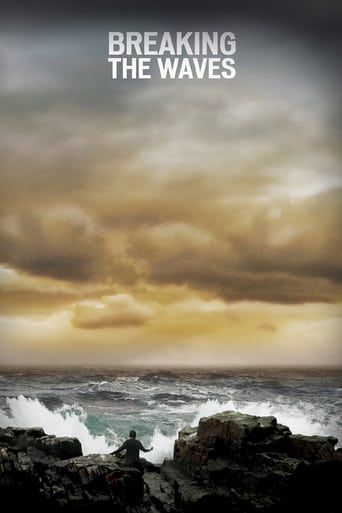



Better Late Then Never
As somebody who had not heard any of this before, it became a curious phenomenon to sit and watch a film and slowly have the realities begin to click into place.
View MoreStory: It's very simple but honestly that is fine.
One of those movie experiences that is so good it makes you realize you've been grading everything else on a curve.
View MoreLars Von Trier is a director who breaks all the conventional rules of the film making, to make strange yet amazing films. His films are always emotionally captivating.Breaking the Waves tells the story of Jan and Bess. Bess is grown up in a highly religious place. She preserved her body with all the purity for her husband. Jan is working in an oil- rig. After the marriage, Jan has to return to the work. In deep love, Bess prays to God to bring him home. The prayer came true. He came home, but due to an accident. As always in Lar's films, the film explores the maximum talent of the actress and resulted in the nomination of Emily Watson for the Best Actress at the Oscars. She also got nominated in many other Awards, including Golden Globe.A definitely must watch film. You are going to love it, if you are a real crazy film lover.
View MoreAs muslimi always wondering how holly the mother marry is. Because so far we all(the women) are full of sins.i am trying to be super objective and less hypocritical here. The main actress is The girl who really loves her faith in God. I think a really found the indescribable word "faith", and this movie has answer it. The pure thought, pure love, but not remain any cheesy feeling. Again, i amuse with the director works. Simply plot, but really enlightening This movie is everyone cup of tea.
View MoreLars von Trier's Breaking the Waves tells the story of Bess McNeill (Emily Watson), a young Scottish woman burdened by psychological issues and the judgments of a frigid, Calvinist community that clings to the traditional teachings of the church. By traditional, I mean classic gender roles and little to no expressive freedoms outside the home can be enjoyed and embraced by females. Bess, like most women in the village, marries young, to an oil rig worker named Jan (Stellan Skarsgård), an atheist who provides Bess with the kind of warmth and acceptance she's not used to, not even from her own family. Bess's relationship with Jan is one of the most significant relationships she has in life, tied only with God, who she prays to each day and converses with Him using her own voice. More on that later.When Jan takes a job out of town, Bess becomes incredibly lonely, one day praying for Jan to come home. Following a serious, nearly-fatal accident at an oil site that leaves Jan paralyzed, Bess curses herself for being "selfish" and wishing for Jan to return home. Because of this, she submits herself to the mercy of Jan, who instructs her to go out in the world and seek the highest form of human pleasure, sexual intercourse, for he feels like a failure of a man for never being able to provide her with such sensations and feelings ever again. The film follows Bess's sexual awakening, as she's caught between the cold shoulders of her family and her village along with the desire to please Jan and adhere to the teachings and expectations of her almighty creator.Von Trier illustrates from the beginning that Bess carries the crippling weight of harsh judgment on her shoulders from numerous different individuals, and downplays the idea of mental illness in favor of showing the repercussions of such pressure. If you were living in a traditional village, already a minority being a female, limited in your rights as a human being, felt ostracized and unloved by your family, harshly criticized no matter what choice you made, and the only person you were able to unconditionally love who loved you back sat on the teetering edge of death and lackluster quality of life, I think you'd be hardpressed not to have a mental breakdown. Von Trier illustrates the Bess character as someone not easily written off as a whiny, insecure twit nor somebody crippled by a mental illness, but somebody tired and worn, and who will only grow to be more exhausted as time goes on.Her conversations with God are the most interesting because, as I stated before, she acts as God responding to her prayers and requests. Her comments as God reflect an assumed bitterness about the Almighty's general attitude towards her and her decisions that seems to more or less be made up of the general opinion of her in her village. This explicitly shows that she has predicated her idea about God's opinion of her thanks to the false, perverted teachings of her Calvinist church and the rejection of her family. It's an ugly way to see life, but who could blame her for not bearing even a shred of confidence after all that she has been through in life? Breaking the Waves follows Bess closely for all one-hundred and fifty-nine minutes, rarely including a scene without her and rarely losing sight of her as a character. Metaphorical interpretation of the character could potentially see her as Jesus Christ himself, somebody well-worn with the responsibility of providing solace (or "saving" in a grandiose sense) to the one she loves, and putting up with a great deal of mistreatment amongst her peers, especially as she turns to prostitution. A key parallel between Bess's story and the life of Christ is when Bess is walking her bicycle through her village, in torn leggings, looking disheveled and moments from collapse, as young children walk behind her, throwing rocks at her and hurling insults. This scene directly mimics widespread interpretation of the Romans taunting Christ as he carried his cross to his death, and in this particular scene, Bess is made so powerless and feeble that the children that tail her are seen as more powerful and worthy than her.The film is shot in the 1990's style known as "Dogma 95" which was characterized by immediacy, naturalism, and the lack of artistic credit. The film is shot with a hand-held camera, using natural, available light and nothing more, and neither von Trier nor any of the actors involve receive credit in the form of opening or closing titles within the film. This provides Breaking the Waves with an additional later of blunt realism, capturing the ugliness of life as is and not tweaking or modifying its appearance to fit some kind of cutesy disposition or inauthentic portrayal of mood. Dogma 95 is a style that effectively communicates ugliness and it does nothing but elevate this film to a grittier height.Whether you're viewing it as a surface exploration of a battered character driving herself off a cliff she's long rested on the edge of or a story that mirrors the life of our lord and savior, Breaking the Waves is a fantastic motion picture, heartbreaking and, not only brutal, but convincing in its depiction of depravity. Von Trier masterfully contrasts the beauty and intimacy sex can bring and the horrid, unexpected consequences it can bring when practiced in a shallow and unsafe manner, along with putting emotionally complex characters on screen for us to evaluate in several different ways. The 1990's was a decade that allowed for revolutionary cinematic movements far and wide, and amidst incredibly pivotal voices of Richard Linklater and Spike Lee, was Lars von Trier, who showed it like it was in a way nobody wanted to see, but needed to.
View MoreWinner of the Grand Prix award at the 1996 Cannes Film Festival, & the first in Lars Von Trier's "Golden Heart Trilogy". "Breaking The Waves" is a cruel, yet somewhat touching film based on a twisted sense of innocence and love. No matter what happens after the credits, the outcome will leave you heartbroken and empty."The Golden Heart" trilogy in a nutshell involves the female protagonist to remain completely naive throughout the story, and virtually give all of herself up to and for the people she loves.Bess (Emily Watson), is a lady with a history of mental problems and is set to marry her beloved Jan (Stellan Skarsgard), despite the negative reactions of her church and family. What begins as a fiery month of passion, tragedy strikes. Though Bess remains faithful, Jan has ideas for Bess that he believes will keep Bess satisfied, and remove any further motivations for suicide.Gut-wrenching to say the least, "Breaking The Waves" is clearly the breakout movie for Von Trier and everyone else involved. Especially that of Emily Watson, whose powerhouse performance will challenge you on just how far you are willing to go with her on this twisted tale. Saying that, story has never been the strongest point of Von Trier's movies, and I easily found myself connecting the cruel twists of fate in this picture to his later work "Dancer In The Dark" (2000). Situations become too bizarre and ludicrous, just for the sake of beating down this poor woman (I guess that was the overall idea). Still with these kind of setups, the actors have incredible potential and a broad range of emotions available. Shot with Trier's Dogme95 Manifesto, the grainy hillsides of Scotland help lift the fog off the ground, and build a landscape that manages to echo that of its subject matter efficiently and eloquently.Final Verdict: Told in chapters to some superb music cues and locations, This depressive story shall grind you down like no other throughout, yet somehow by the end it manages to instill a sense of hope and optimism rarely seen in cinema. Or at least more than most blatant Hollywood romances go. 7/10.
View More